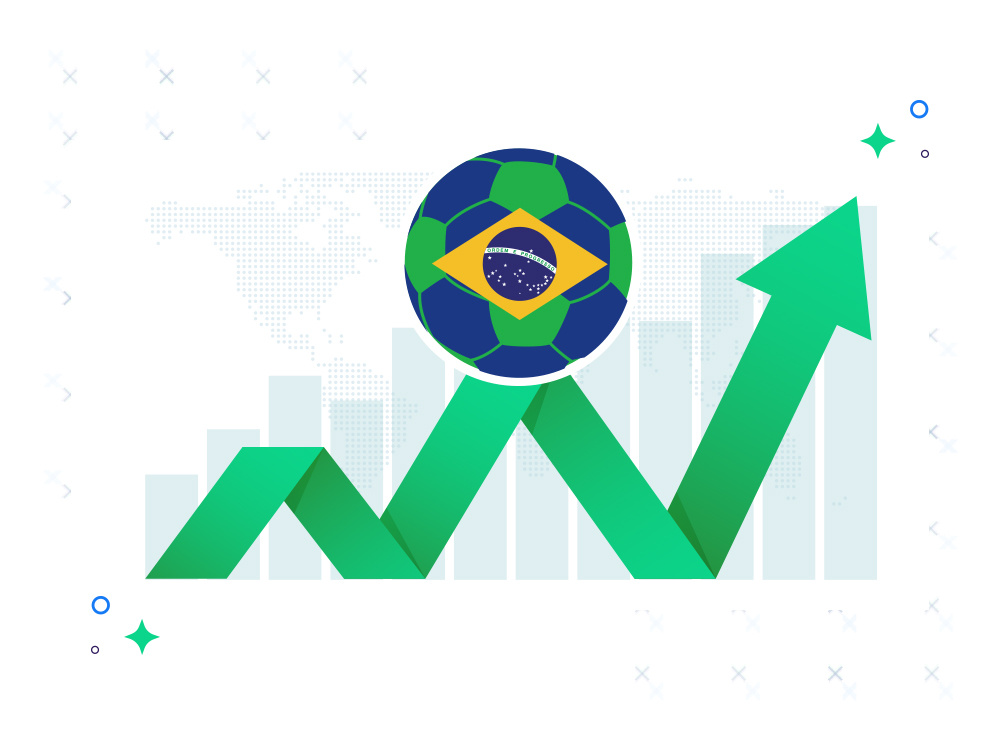Latin America (LATAM) has emerged as a thriving market for gambling, casinos, and iGaming, with Brazil leading the charge in regulatory developments and market potential. As the industry evolves rapidly, it's crucial to stay informed about the latest trends and changes. In this blog, we'll explore six key developments shaping the LATAM gambling landscape, with a particular focus on Brazil's ambitious regulatory timeline and market growth projections.
Here are the top 6 developments we'll summarize and analysis in this blog:
- Is the timeline for Brazil's sports betting regulation achievable?
- The influence of religion on Brazil's legislative outcomes in gambling
- Will Brazil's sports betting market really grow 50% annually?
- Upcoming regulations for Brazil's iGaming operators
- Exceptions for data centers outside Brazil
- The role of email marketing in the growing LATAM gambling market
Each of these developments offers valuable insights into the challenges and opportunities facing the LATAM gambling industry. Let's dive in and explore how these factors are shaping the future of gambling in one of the world's most dynamic markets.
Table of Contents
- Is the Timeline for Brazil Sports Betting Achievable?
- Religion's Influence on Brazil’s Legislative Outcomes
- Will Brazil's Sports Betting Market Grow 50% Annually?
- What Kind of Regulations Are Coming For Brazil iGaming Operators?
- What are the Exceptions for Data Centres Outside Brazil?
- An Email Service Provider (ESP) for the iGaming, Gambling, and Betting Industry
Is the Timeline for Brazil Sports Betting Achievable?
Brazil's sports betting market is on the verge of a significant transformation, with the government aiming to fully implement regulations by July 2024. This ambitious timeline is structured into four distinct phases, each addressing critical aspects of the regulatory framework.
- April 2024: The first phase involves publishing the technical, payment, and security requirements for operators. This stage also includes guidelines for licensing applications.
- May 2024: The second phase focuses on anti-money laundering policies and rules to protect bettor rights. This includes measures against terrorist financing and other types of fraud.
- June 2024: The third phase will establish technical requirements for online gaming and procedures for monitoring gambling advertising.
- July 2024: The final phase will cover procedures for allocating industry contributions to socially responsible causes.
While the timeline is structured and clear, several factors could influence its achievability:
- Regulatory Coordination: The Ministry of Finance has established the Regulatory Policy of the Prizes and Betting Secretariat (SPA) to oversee the process. However, coordination between various government departments is crucial. The Ministry of Sport, for instance, has a 45-day period to assess license applications, which could potentially cause delays.
- Industry Readiness: The industry must adapt quickly to the new requirements.
- Legal and Social Implications: The new regulations stem from Bill 3,626, signed into law by President Lula in December 2023. The bill faced several hurdles, including debates over tax rates and the inclusion of iGaming, before its approval. Additionally, from January 2025, unlicensed operators will be deemed illegal and may face penalties, including URL blocking.
The timeline for Brazil's sports betting regulations is ambitious but potentially achievable. If all parties involved can work diligently and cohesively, Brazil could see a fully regulated sports betting market by July 2024, marking a new era for the industry in one of Latin America's most thriving markets.
Religion's Influence on Brazil’s Legislative Outcomes
Brazil has the highest percentage of citizens who believe in God or a higher power (89%) among 26 countries surveyed in the Global Religion 2023 study. This religious fervor has translated into political power, with evangelical lawmakers wielding considerable influence in the Brazilian Congress.
The evangelical movement has grown substantially in Brazil, with approximately one-third of the population identifying as evangelical in 2022. This demographic shift has resulted in a strong evangelical presence in the legislative branch, significantly impacting gambling-related bills.
While religious influence remains strong, there are signs of potential shifts:
- Economic Arguments: Some industry experts argue that regulation would better control the existing gray market and provide economic benefits.
- Gradual Acceptance: As gambling becomes more accepted globally, there's a possibility that attitudes in Brazil may slowly change.
- Ongoing Debates: The passage of Bill 3,626/2023 in December 2023 suggests that pro-gambling factions can sometimes overcome religious opposition, though the process remains challenging.
In conclusion, religion, particularly evangelical Christianity, continues to be a major factor in shaping Brazil's gambling legislation. While there has been some progress towards regulation, religious influence remains a significant hurdle for comprehensive gambling reform in the country.
Will Brazil's Sports Betting Market Grow 50% Annually?

The projection of 50% annual growth for Brazil's sports betting market is ambitious but potentially achievable, given the recent regulatory developments and the country's massive untapped potential.
According to a study by Redirection International, Brazil's online sports betting market is expected to grow by an annual average of 50% until 2028. This projection is based on several factors, including the rising popularity of sports betting, technological innovations, and the anticipated entry of large international companies into the newly regulated market.
Brazil already boasts impressive numbers in the sports betting sector. In 2022, the country registered 3.2 billion accesses to sports betting sites, making it the country with the largest number of users in this domain. This existing enthusiasm for sports betting, combined with the new regulatory framework, creates a fertile ground for rapid market expansion.
The passage of Bill 3,626/2023 in December 2023, which regulates sports betting and iGaming, is a game-changer for the Brazilian market. This legislation provides a clear legal framework for operators, potentially attracting more investment and fostering market growth. The regulatory structure, which includes licensing fees of BRL30 million (approximately $5.9 million) for up to three brands, is expected to create a more stable and trustworthy environment for both operators and bettors.
Data from the market information platform Datahub reveals that between 2020 and 2022, the number of sports betting companies in Brazil jumped from 51 to 239, a staggering increase of 368.6%. This rapid growth occurred even before the implementation of the new regulations, suggesting that the regulated market could see even more dramatic expansion.
However, it's important to note that this projected growth rate is not without challenges. The high regulatory costs, including licensing fees and technical certifications, may lead to consolidation in the market through mergers and acquisitions. This could result in fewer, but larger and more robust operators dominating the market.
While the 50% annual growth projection is optimistic, it's not entirely unrealistic given Brazil's large population, strong sports culture, and the pent-up demand created by years of regulatory uncertainty. However, the actual growth rate will depend on various factors, including the effectiveness of the new regulations, the speed of market adaptation, and the overall economic conditions in Brazil.
What Kind of Regulations Are Coming For Brazil iGaming Operators?

Brazil is in the midst of implementing a comprehensive regulatory framework for iGaming operators, with several key regulations already established and more on the horizon. The new rules aim to create a structured and transparent environment for the industry, promoting responsible gaming while ensuring effective tax collection.
Key Regulations for iGaming Operators
- Taxation on Player Winnings: A significant aspect of the new regulations is the taxation on player winnings. According to Normative Ordinance No 2,191, players will face a 15% tax on net winnings exceeding BRL2,824 (approximately $547.25). This tax will be deducted at the source before players receive their winnings, with operators responsible for calculating and collecting the tax contributions. The net prize is defined as the difference between the value of the winnings and the amount bet after each sporting event or iGaming session. Notably, losses incurred by players are non-deductible, which has raised concerns about the fairness and potential impact on the market.
- Payment Methods: Normative Ordinance No 615 has banned operators from accepting payments via credit cards or cryptocurrencies. This measure aims to ensure greater control and transparency in financial transactions within the gaming industry, potentially reducing the risk of money laundering and other financial crimes.
- Data Center Location: Normative Ordinance No 722 provides exceptions for data centers to be located outside Brazil, provided that the countries where these centers are situated have an international legal cooperation agreement with Brazil. This regulation ensures that data handling and storage comply with international standards while maintaining legal oversight.
- Advertising and iGaming Requirements: The upcoming stages of the regulatory rollout will include detailed rules on advertising and specific iGaming requirements. These regulations are expected to be announced by the end of July 2024. The goal is to ensure that advertising practices are responsible and that iGaming operations meet high standards of fairness and security.
- Social Responsibility Contributions: The final phase of the regulatory implementation will address how industry contributions are allocated to socially responsible causes. This aspect underscores the government's commitment to ensuring that the benefits of a regulated iGaming market extend to broader societal improvements.
The Brazilian Institute of Responsible Gaming (IBJR) has expressed concerns about the new tax framework, labeling it as "harmful" and "legally questionable." The IBJR argues that taxing winnings without allowing for the deduction of losses could unfairly penalize players who do not realize net gains, potentially undermining the constitutionality of the rule and negatively impacting the market's health.
What are the Exceptions for Data Centres Outside Brazil?
According to Normative Ordinance No 722, while data centers are generally required to be located in Brazil, there are some exceptions allowing for data centers to be situated outside the country under specific conditions:
- The country hosting the data center must have an international legal cooperation agreement with Brazil covering both civil and criminal matters.
- Data holders abroad must provide advance authorization for data transfer.
- The responsible technical area of the Ministry of Finance must have secure and unrestricted access to the data.
- The operating agent must replicate its database and information in Brazil, ensuring all databases have the same content through continuous updates and periodic testing.
- Operators must present the SPA (Regulatory Policy of the Prizes and Betting Secretariat) with an explanation for maintaining their systems outside Brazil.
- The data center should have ISO 27001 certification.
- The operating agent must have a business continuity plan that maps out probable loss scenarios, includes a risk assessment, and establishes preventive and mitigating actions.
These exceptions allow operators to maintain their platforms abroad if they adhere to the specified requirements. However, they must still ensure compliance with Brazil's data protection laws and maintain transparency for users. This approach balances the need for regulatory oversight with the operational flexibility that some international operators may require.
An Email Service Provider (ESP) for the iGaming, Gambling, and Betting Industry
As Brazil's sports betting market grows rapidly, effective communication strategies are essential for operators to engage their audience and stay competitive. This is where email marketing becomes invaluable, helping companies build relationships, send personalized offers, and retain customers.
Finding an email service provider (ESP) that supports the unique needs of the sports betting industry is crucial. SendX stands out by welcoming legitimate businesses across various sectors, including sports betting and iGaming. Unlike some ESPs that avoid these industries, SendX supports operators who adhere to product guidelines and ethical practices.
With SendX, sports betting companies can leverage powerful email marketing tools without fear of sudden account suspensions. This reliability is vital in a market where timely communication can make all the difference.
To help you get started, SendX offers a 14-day free trial. Experience the benefits of a robust email marketing platform tailored to your needs. Sign up for your free trial today and see how SendX can help your business thrive in Brazil's booming sports betting market.
